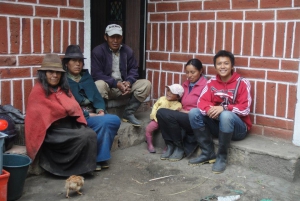
Why did you choose this program?
Although I received more out of my experience than I intended to, my original intent to take bridge year was simply to mature as a person; I lacked a lot of confidence in myself coming out of my sheltered high school experience. I chose Global Citizen Year because it seemed the most structured and community immersive and I wanted to be able to tackle my insecurities through a community that I could accustom myself to for a long period of time. The program also generously provides financial aid to the fellows that they accept, and it was the only way that I would be able to fund an experience. If anything, I feel like the strangest candidate to have traveled abroad for a year, but Global Citizen Year offers this opportunity to high school graduates without the financial means but are committed to their personal growth and growth as leaders.
What did your program provider assist you with, and what did you have to organize on your own?
Global Citizen Year provided nearly everything: my tuition (need-based financial aid), a host family placement, apprenticeship placement, food stipends, leadership training and global development seminars, Spanish Classes, and flights. It all sounds too good to be true, but they did. The only thing that I had to organize was my day to day experience working with my apprenticeship organization; sometimes I had so much free time that I'd find other opportunities on my own like farming with a rural, indigenous Ecuadorian family and helping out with English classes at some of the local elementary schools. The program and the city of Riobamba in general are very conducive to finding volunteer opportunities.
What is one piece of advice you'd give to someone going on your program?
I would tell the fellows not to get so caught up in what they need to do and all the experiences they need to scramble to have and all the places they need to visit. I spent a lot of my time traveling and jumping from my farm, to work, to school, to home, to Spanish class, and vacation spots, and I wish I had spent more time with my host family, being present with them, having good conversations with them. The most challenging thing is getting to know people different from you, and I think all the thrills of being in a new country actually detracted from how deeply I connected with the people I was supposed to feel closest to.
What does an average day/week look like as a participant of this program?
I lived in the city of Riobamba, smack in the middle of the country, so it was a hub for and a gateway to the coastal, andean, and amazonian cultures of Ecuador. I had very little to do at my apprenticeship, so throughout the week I would choose to visit various elementary schools, take an hour long bus ride to the two family farms that I worked at, or help my org with the farmer's markets we held. Living in the provincial city capital, I spent a lot of time exploring, studying in cafes, and biking around the city. To be perfectly honest, I hardly contributed anything to my schools, my farm, and my apprenticeship organizations, I mostly spent my time getting to know the people I worked with, getting to know my students, and experiencing the indigenous culture of family whose farm I worked on. It was essentially a year just meet people and build relationships with such a diverse set of people.
Going into your experience abroad, what was your biggest fear, and how did you overcome it and/or how did your views on the issue change?
Ecuadorians are really friendly and inviting people; honestly, I wasn't really scared much about the programming experience, or if I was scared, I realized there was nothing really to be scared about because Global Citizen Year provides so much on the ground support (ex: Will I get along with my host family? What if I get sick? What if I feel like I have no direction? etc.)
To my surprise, I realized when I entered the program my greatest fear (but also my greatest excitement) was getting along and fitting in with a program class made up of of people who were so different than the people I usually surrounded myself with. Coming out of high school, I still hadn't gotten over the fear of not fitting in. But the fellows I traveled with during my bridge year were the relationships I grew deepest in, and I found it challenging that so many of the fellows had such different world views. I perhaps experienced as much cultural diversity and differences through the fellows as I did with Ecuador itself. I was a very impressionable and moldable kid, and it was because of these fellows that I thought more deeply about God and what I value in relationships. I was very sheltered in high school and it was the first time I felt myself at the threshold of competing points of view, injustices, and the serious emotional issues that plague communities that I was hardly aware of. There isn't much to say about how jarring it is to know that the world (or even myself) didn't function as peacefully as I believed it to; I just needed to experience it.
How would your life be different had you not taken a bridge year with Global Citizen Year?
If I hadn't taken a Global Citizen Year, pure science and academia would probably be the only things that I think about, and I probably would not have thought deeply about my faith. During my bridge year, I also developed this child-like belief that anyone from anywhere can get along with each other, and I think without it, I wouldn't be as excited to get to know people who are different from me in general.